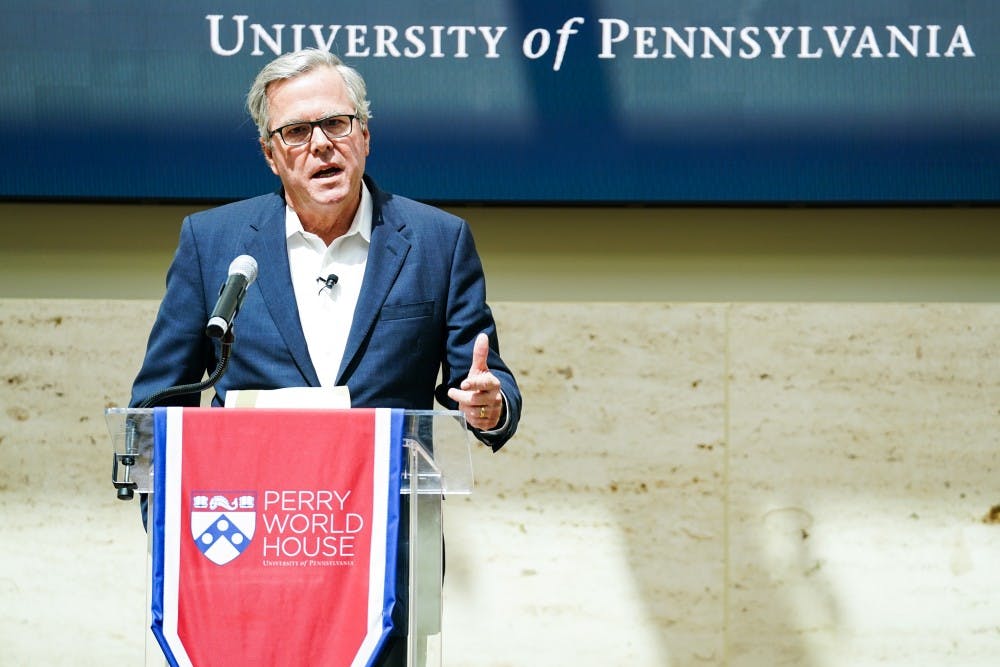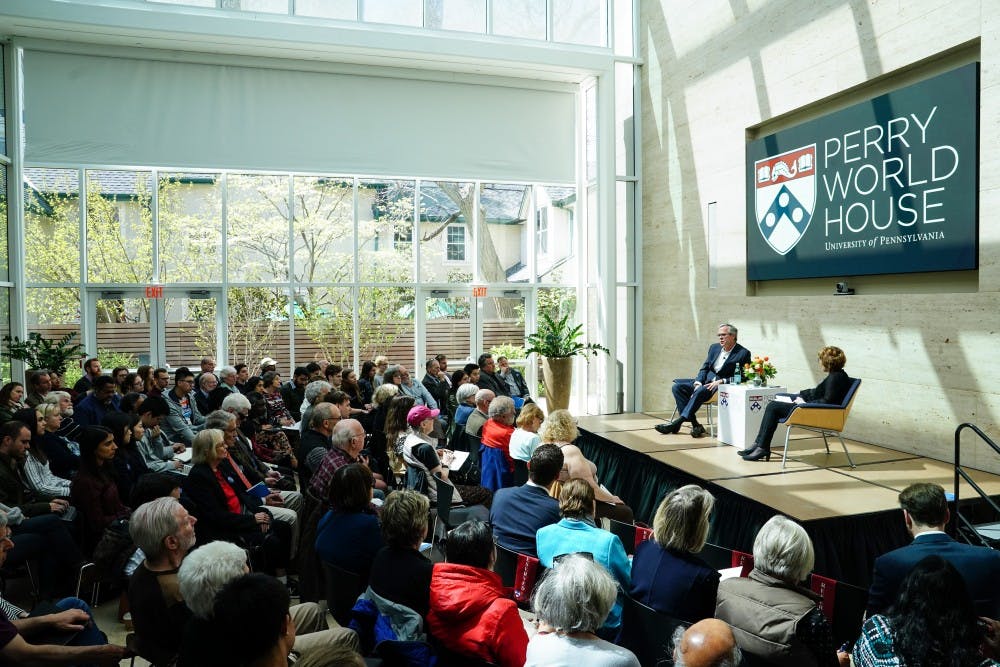
Former Florida governor Jeb Bush spoke about the role of private industries and individual citizens in finding solutions to climate change.
Credit: Chase SuttonSeveral international political figures, including former Florida Governor Jeb Bush, came to Penn's campus to speak about climate change policy at Perry World House's two-day 2019 Global Shifts Colloquium on Tuesday.
At the summit, speakers presented differing perspectives on climate change reform and the role the United States must take on. Speakers included Penn Presidential Professor of Practice Bush, former Environmental Protection Agency Administrator Gina McCarthy, and Mayor of Quito, Ecuador Mauricio Rodas. The event also featured a Kleinman Center for Energy Policy lecture with Rachel Kyte, chief executive officer of Sustainable Energy for All, an international organization focused on energy policy. While the first day of the summit was restricted to academics and policymakers, Tuesday's events were open to the public.
During Bush's talk on “State Policymaking for Climate Adaptation and Mitigation," the former governor spoke about his dismay over the current state of national politics and stressed the power of private markets and individuals to help reduce climate change.
Bush also toyed with the idea of relying more on nuclear power plants, noting that it was a scalable source of clean energy.
“In other parts of the world, nuclear power is actually not a pariah," Bush said.
But Bush lamented the lack of common ground in national politics and called for more state control. He also said he had more confidence in private markets and individuals to develop solutions to climate change than in the federal government.
“I trust the interaction of a bunch of crazy people in their garages innovating through trial and error to create solutions,” Bush said.

Bush has spoken at Penn on several occasions since becoming a Presidential Professor of Practice, most recently on April 11 at the annual Silfen Forum.
At the “National Policymaking for Climate Adaptation and Mitigation” talk, McCarthy offered blistering criticism of the current administration and called on the United States to lead the global fight against climate change.
“We have to lead once again, not just in the United States but across the world,” McCarthy said. “[It is] embarrassing to go to international conferences and have to start off by saying ‘I’m really sorry about what the United States of America is doing today.’”
McCarthy also contrasted the current administration’s support for fossil fuels with her vision for a greener America.
“I don’t care what this president or any future president says. We’re not bringing back coal. We are not celebrating oil dominance,” she said. “A zero carbon future is a better one. It is a healthier one."
McCarthy noted that universities should also take action to address climate change. When asked by an audience member whether Penn should divest from fossil fuels, she replied without hesitation: “Yes!”
Frederick Steiner, the dean of Penn’s Weitzman School of Design, also discussed the impact of climate change from a design perspective at the first event of the colloquium.
“The Dutch since the Roman times have learned how to live below sea level,” Steiner said. “The challenge both of us have with climate change and sea levels [rising] is that we have about 20 or 30 years to learn what the Dutch learned in two millennia," he added, referring to policymakers and designers.

After delivering opening remarks, Bush engaged in a conversation with NPR reporter Deborah Amos.
Steiner’s remarks were followed by a discussion on “City Policymaking for Climate Adaptation and Mitigation," which featured Rodas, who received a government administration master’s degree from Penn’s Fels Institute of Government in 2002 and a political science master’s degree from the School of Arts and Sciences in 2003.
As mayor of Quito, Rodas said he oversaw the construction of Ecuador’s first metro line, which promises to significantly reduce Quito’s emissions when completed later in 2019. He added that combating climate change starts with local government.
“Cities are where most emissions takes place,” Rodas said. “It would be in cities where the fight against climate change would be most effective.”
During the final panel, “Global Policymaking for Climate Adaptation and Mitigation,” Zeid Ra’ad Al Hussein, Perry World House’s Distinguished Global Leader in-Residence and former United Nations High Commissioner for Human Rights, said man-made climate change was comparable to fraud.
“Essentially, our generation has created a Ponzi scheme,” Hussein said. “We live off our profit economy and energy that was relatively cheap, and we’re passing it all to the next generation.”
College senior Bryce Klehm said the last panel left a deep impression on him. “I think the urgency of it was probably the main takeaway,” Klehm said, referring to the imminent danger of climate change.
College freshman Sarah Ko said the summit helped her realize that individual people could also contribute to the fight against climate change.
“While it is a global issue, there are a lot of things to do at a local level,” Ko said. “People see climate change as such a big problem, that it’s almost like it has an end that is unattainable to reach for some people.”
The Daily Pennsylvanian is an independent, student-run newspaper. Please consider making a donation to support the coverage that shapes the University. Your generosity ensures a future of strong journalism at Penn.
Donate






